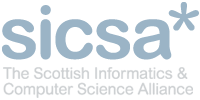by Dr Rosa Filgueira
22 January 2018

My exchange involved visiting Ewa Deelman and Yolanda Gil, both located in the same University (USC) and Institute (Information Science Institute – ISI), from 30th September to 10th December 2017. This visit gave me the great opportunity to work with two World-leading authority on the research and development of advanced information processing technologies and intelligent systems to support extracting knowledge from data and scientific discovery.
Before my arrival, I performed several teleconferences with both, Ewa and Yolanda, so we narrowed the aim and the scope of the visit beforehand. I think that going there with already two pre-defined research-lines in mind helped me a lot to have a successful exchange.
For more than 15 years, Ewa has been conducting and leading the research in scientific workflows. After a couple of meetings, we decided to work together in a new scalable and tolerant monitoring data-streaming framework, which allows us to collect, pre-process, store and visualize data in real-time. This framework is aligned with the Panorama project (https://panorama360.github.io/), an approach to performance modelling and diagnosis of extreme-scale workflows, where Ewa is the Principal Investigator.
Currently, this framework is being evaluated at the British Geological Survey (BGS), as a possible architecture for monitoring real-time sensor data and creating an alert system for interpreting sensors at the field (http://www.bgs.ac.uk/ukgeoenergyobs/).
Yolanda’s research focuses on intelligent interfaces for knowledge capture, which involves topics such as semantic annotation tools or community-wide development of knowledge bases. Yolanda has recently started a new project called MINT: Model Integration through Knowledge-Rich Data and Process Composition (http://mint-project.info/), which I was invited to participate as an external collaborator. Together we developed a new intelligent catalog for hydrological knowledge capture. The new catalog acts as a semantic data hub for choosing which countries to work with in this project (e.g. countries for which we have more datasets available). The next steps will be to link the catalog and mount it in public repository to make queries against it.
During my visit, I also had the opportunity to meet other researchers and groups, through several face-to-face meetings and by giving a seminar at the end of the exchange https://www.isi.edu/events/calendar/11376. Presentation available at https://github.com/rosafilgueira/datastreaminghub/blob/master/Presentation_ISI_17_RF.pdf
These collaborations haven’t finished after my visit, since I am still in touch with both hosts, and we have several ideas for continuing collaborating together (e.g. a draft of a paper for eScience conference or future bids and grants).
The research conducted during this visit at USC/ISI is not only very valuable for me, in terms of my career, as well for the institution where I work as a data scientist. At BGS, I participate in several national and international funded projects (such as EPOS, UKGEOS or Envriplus), where new data-streaming architectures as well intelligent catalogs are needed to improve the interoperability and accessibility of models and data. Therefore, the work conducted at USC/ISI and the new skills learnt would have a positive impact in the projects that I am currently working on.

Deelman and her team at ISI. (L-R) Back row: Tu Mai Anh Do, Mats Rynge, Karan Vahi, George Papadimitriou. Front row: Rosa Filgueira, Ewa Deelman, Rajiv Mayani
I really encourage early career researchers to take advantage of the SICSA PECE grant. It will have a high impact in your future steps as a researcher and it will allow you to increase your network of contacts, and skills while you are working full-time (for a period of time) in an area of your interest.











